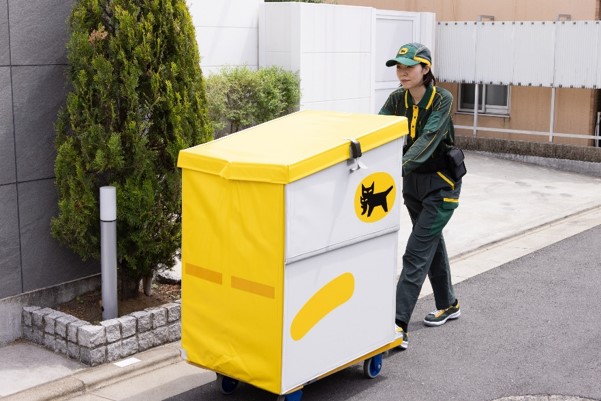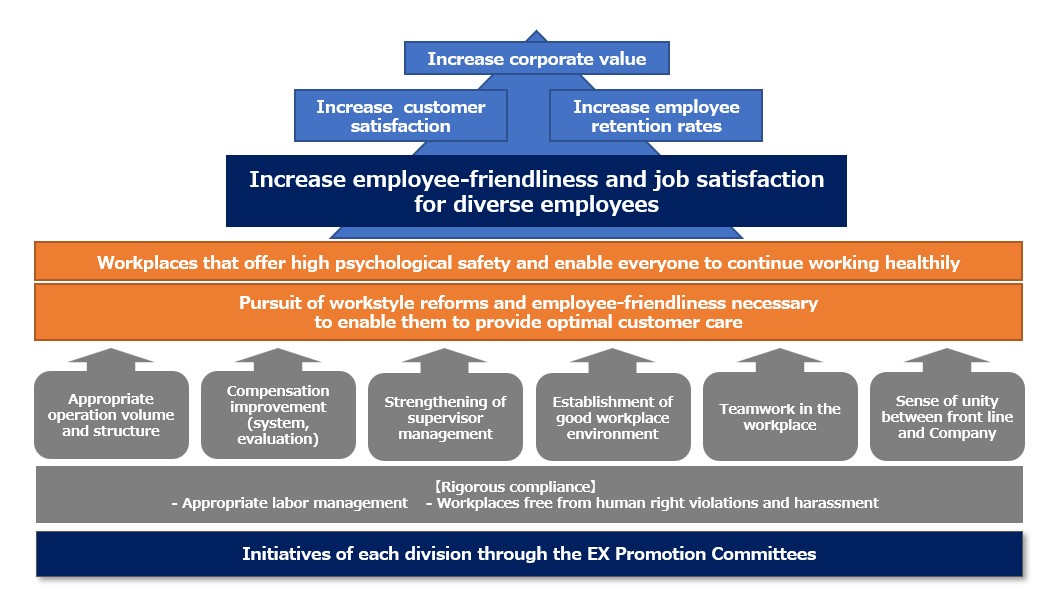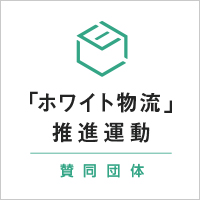Labor Practices
Promotion Structure
The Yamato Group accepts freedom of association, the right to organize and the right to collective bargaining as the rights of employees, and concludes labor agreements with labor unions. It also holds labor-management consultations and committee meetings between employee representatives and management, and implements labor-management dialogues while improving various schemes and exchanging opinions on the management environment on a regular basis, in addition to holding consultations on wages, lump sums, and occupational health and safety.
In terms of labor standards such as salaries and working hours, we comply thoroughly with the laws and regulations of each country and pay living wages and lump-sum payments that enable employees to maintain a certain standard of living, in order to create a better working environment.
The Yamato Group believes that in order to conduct its business activities in a sustainable manner it is important to contribute to the development of the countries and regions in which it conducts business, and to build good relationships. At our locations in each country and region we focus on hiring local human resources, and engage in management based on the unique cultures and current situations in each area.
The Yamato Group will continue to pursue better labor practices and contribute to the achievement of decent working conditions.

Policy on reduction of working hours
Under the Yamato Group Human Rights Policy, the Group considers overwork to be a serious human rights issue and strives to limit working hours by reducing excessive hours and encouraging employees to take annual paid leave.
Work interval system
Yamato Transport strives to ensure a rest period (interval) of at least 11 hours between the end of work on one day and the start of work on the following day to ensure that employees can have a reasonable amount of rest.
Promoting annual leave utilization
Yamato Transport encourages systematic utilization of annual leave, such as taking a week of continuous leave and taking leave on celebration days. We aim to see individuals use at least 90% of their annual leave.
Planned working hours
At Yamato Transport, workers and management set the planned number of working hours in a year to curb long working hours and realize work-life balance (2,260 hours for the fiscal year ended March 31, 2024).
Decent Work Strategies
"All-inclusive management"
Each and every Yamato Group employee thinks from the customer's point of view, making decisions and acting on their own initiative. The coming together of its employees is the source of the Yamato Group's power. This is the DNA that we have inherited from generation to generation. A major prerequisite for all-inclusive management is a workplace environment where employees can work actively, and we believe that creating such an environment is the most important issue for management.
In terms of measures to prevent long working hours, we reviewed the rules for managing working hours at Yamato Transport, digitized building entry and exit data, and reorganized main branch offices. We have also pursued ease of working by taking the lifestyles of each employee into account, such as by improving the workplace environment, introducing a selection system for working days and working hours, and reviewing the content of our services.
In order to revitalize internal communication, we have held panel discussions with frontline employees, enabling them to directly convey their voices and proposals for business process improvements to the president and other executive officers. At the same time, we have also been working on measures to help employees feel greater job satisfaction and the joy of working on a daily basis by establishing rules for conversion to permanent (unlimited term) employment, reviewing personnel schemes and evaluation systems, and enhancing welfare and benefits programs.
The Transformation Plant YAMATO NEXT100 highlights labor as one of the material issues for the next 100 years and aims to contribute to achieving "decent work" by 2030. Under the Yamato Group’s Medium-Term Management Plan “Sustainability Transformation 2030 ~1st Stage~,” announced in February 2023, we will continue measures to build welfare and benefits systems tailored to employees’ life plans, as well as promote human rights due diligence, diversity, and the advancement of women in the workplace, so that diverse personnel can work more easily and with a greater sense of satisfaction. Moving forward, we will continue to build a comfortable workplace environment where employees can take pride in their jobs.
Human resource strategies based on definition of duties
The Yamato Group has prepared 845 Documents for Definitions of Duties specifying the work details, scope of responsibility, knowledge, and skills required of employees for each position. The documents clarify roles and duties for each individual employee. With these, we have crated a system for evaluating employees who reliably perform the roles expected of them. This increases their sense of acceptance and fairness and leads to greater job satisfaction.
Implementation of Telework System for Call Centers
In order to reduce the risk of COVID-19 infections and facilitate various working styles, we have made it possible for call center personnel to work remotely. This has enabled workers to work at home and from satellite offices, and given them more options for working locations and times.
We offer this telework system not only to employees but also to part-time workers, to make work more comfortable for as many people as possible. We aim to enable workers to achieve a healthy work-life balance through flexible working styles.
Support for Ensuring a Balance Between Work and Childcare / Caregiving Responsibilities
In 2018, the Yamato Group conducted a survey on awareness and actual conditions related to childcare and caregiving, and is considering and developing group-wide support schemes and measures for employees with childcare and caregiving responsibilities, in order to improve the ease of working for these employees.
Major Group companies support the work-life balance of employees by allowing employees to work shorter working hours for childcare until the end of the sixth grade of elementary school, and take up to 365 days of caregiving leave, both of which are in excess of the statutory periods.
In addition, since September 2018, Yamato Transport has been working to create an environment that makes it easier to use these schemes, such as allowing employees with childcare and nursing care responsibilities to choose their number of working days per week, from three or four days.
We have created a handbook for employees with childcare and caregiving responsibilities (and their superiors) in order to support a healthy work-life balance, and have made it available for download from our intranet site. We are also introducing telework and flextime schemes. To make possible diverse work styles and increase operational efficiency and productivity, we have broadened the scope of the telework scheme to allow part-timers to telework. Since the number of male employees taking childcare leave is also increasing, we will continue to consider measures that lead to greater understanding in the workplace and from superiors, and continue to periodically communicate information on work-balance support schemes.
Support Schemes for Childcare and Caregiving (Yamato Transport examples)
| Childcare leave |
|
|---|---|
| Childbirth Leave |
|
| Child nursing care leave |
|
| Shorter working hours for childcare |
|
| Caregiving leave |
|
| Short-term caregiving leave |
|
| Shorter working hours for caregiving |
|
Numbers of employees taking childcare and caregiving leave and shorter working hours
As a result of these initiatives, Yamato System Development has obtained Platinum Kurumin certification from the Ministry of Health, Labour and Welfare (MHLW) as companies that engage in efforts to provide childcare support, based on the Act on Advancement of Measures to Support Raising Next-Generation Children. (As of March 2024)
Standby work system
Yamato Transport has introduced a “standby work system” under which Sales Drivers take turns to be on standby to respond to irregular situations.
This prevents workers from having to suddenly work on their days off and establishes an environment that enables them to rest during emergencies, such as health or family situations. In this way, the company has created a work environment where employees and their families have a sense of security.
TOPICS
Supporting the "White Logistics" Movement Toward Work Style Reform for Logistics
In the face of major environmental changes, such as the rapid growth of the e-commerce market and tight supply and demand in the labor market, stabilization of logistics functionality is a major issue for society as a whole.
In response to this, the Ministry of Land, Infrastructure, Transport and Tourism (MLIT), the Ministry of Economy, Trade and Industry (METI) and the Ministry of Agriculture, Forestry and Fisheries (MAFF) launched the White Logistics Movement, with the aim of improving trucking productivity and logistics efficiency and creating a sound and healthy working environment that is easier for workers, including female and senior drivers (in their 60s) to work comfortably.
Yamato Transport supports the White Logistics Movement-an initiative for companies involved in logistics-and is working to improve logistics in mutual understanding and cooperation with suppliers and other stakeholders in order to achieve the realization of highly productive logistics and working style reforms.
Dialogues with Employees / Improving Satisfaction
We are implementing various measures to increase the job satisfaction of employees throughout the Group.
Employee Awareness Survey
We have been conducting Working Styles Awareness Surveys and Engagement Surveys with employees across the Yamato Group to understand the current working environment and make improvements.
In the survey conducted in the fiscal year ended March 31, 2024, although “employee-friendliness” increased, the other indicators all fell. The Group is positioning an increase in job satisfaction as the issue that we should prioritize. To enhance items that strongly correlate with job satisfaction, we are working to advance mutual understanding through smooth communication and create a working environment that respects diverse approaches and values. These efforts included implementing exchanges of opinions between Sales Office managers and management at all regional branch offices of Yamato Transport from January to March 2024, sharing values that reflect the direct connection between customers and employees, and implementing workplace discussions that aim to realize a working environment that encourages job satisfaction. The Group will continue to identify issues and take steps to address them based on the results of surveys to develop working environments in which employees can enjoy an employee-friendly environment, experience job satisfaction, and work energetically.
EX Promotion Committees
The Yamato Group has established these committees at each Group company to hold discussions on how to increase employees’ pride in their work and sense of satisfaction, and how to promote diversity, and then implement the ideas.

Performance Commendation System
Yamato Transport has established a performance commendation system that recognizes examples of voluntary success that produce results in the first half and second half of each fiscal year, on an individual business location or project basis. The President's Award is presented to particularly outstanding Groups, with assessment criteria for selection including a clear causal relationship between purpose, efforts and results.
In FY2022 there were 126 entries, 15 of which received the President's Award. The Office of Excellence Award was presented to 103 offices that successfully achieved zero incident rates for traffic accidents, industrial accidents, work task accidents, and complaints over a period of six months, as well as receiving at least one or more compliments from customers.
The number of entries and awards is also increasing year by year, as a result of increases in awareness of improvements and reforms among individual employees and various initiatives being implemented on the front lines.
"Kuroneko Tamago" Proposal System
"Kuroneko Tamago" is a system that allows all Yamato Transport employees to make proposals for business improvements, new products and services. In addition to making their own proposals, employees can also vote and give their opinions on those submitted by other employees. Among the proposals and opinions received, the Hint Award is awarded to those proposals considered for actualization.
In FY2023 there were 268 proposal entries, 42 of which received the Hint Award.

